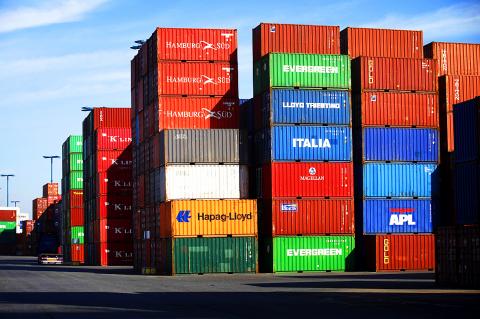Evergreen Marine Corp (長榮海運), the nation’s largest container shipping company, plans to charter seven new vessels with capacity of 14,000 twenty-foot equivalent units (TEU) to upgrade its fleet at lower unit costs.
However, the upgrade plan might not have a significant impact on the container shipper’s capacity, as the company is to gradually retire some of its old and smaller vessels with lower operating efficiency.
The seven vessels — owned by Sumitomo Corp, a leading integrated trading company in Japan — are scheduled to be delivered to Evergreen in 2016 and 2017, with a 10-year term of tenancy.

Photo: Bloomberg
“The decision fits into the company’s fleet replacement plan,” Evergreen Marine said in an announcement on the Taiwan Stock Exchange (TWSE).
With the world’s three-largest container shippers announcing plans to introduce a set of vessels with capacity above 10,000 TEUs, the trend to operate larger container ships to save unit costs has been confirmed.
Evergreen launched a plan last year to introduce more large vessels.
The company announced last year it will charter 10 container ships with capacity of 13,800 TEUs — built by Hyundai Heavy Industries — from Greek shipowner Enesel SA.
The container shipper has taken delivery of two of the 10 vessels since September last year, with the remaining eight to be delivered in the second half of the year.
However, Evergreen Marine said the plan would not increase supply in the container shipping industry significantly, as the company intends to replace some of its smaller vessels during the period by eliminating its self-owned ships or not extending the leasing contract of its chartered vessels.
Evergreen Group (長榮集團) vice chairman Bronson Hsieh (謝志堅) said last month that demand for this year on container shipping sector could rise on the back of global economic recovery. Evergreen Marine has also announced to implement a rate restoration program for routes from Far East and Indian Sub-Continent to Europe and the Mediterranean region by US$500 per TEU, or by US$1,000 per forty-foot equivalent unit (FEU).
The rate-hike plan, effective on Wednesday, reflects the company’s brighter outlook for this year. Hsieh said the company is considering joining the Green Alliance, also known as the CKYH alliance, to improve its competitiveness.
The Green Alliance comprises a group of several Asian container shipping companies, including Taiwan’s Yang Ming Marine Transport Corp (陽明海運), China Ocean Shipping (Group) Co (中遠集團) of China, Japan’s Kawasaki Kisen Kaisha Ltd — known as “K” Line — and Hanjin Shipping Co of South Korea. In the first three quarters of last year, Evergreen Marine posted a net loss of NT$2.19 billion (US$72.91 million), or NT$0.63 per share, its financial statement showed.
However, the container shipper might still post a profit for the whole of last year, thanks to its strong non-operating gains. Last month, the company announced that its full-owned subsidiary, Greencompass Marine SA (青標海運), disposed of containers worth NT$2.24 billion, which may lead the company to earn a total of NT$44.8 million, its stock exchange data showed.

MULTIFACETED: A task force has analyzed possible scenarios and created responses to assist domestic industries in dealing with US tariffs, the economics minister said The Executive Yuan is tomorrow to announce countermeasures to US President Donald Trump’s planned reciprocal tariffs, although the details of the plan would not be made public until Monday next week, Minister of Economic Affairs J.W. Kuo (郭智輝) said yesterday. The Cabinet established an economic and trade task force in November last year to deal with US trade and tariff related issues, Kuo told reporters outside the legislature in Taipei. The task force has been analyzing and evaluating all kinds of scenarios to identify suitable responses and determine how best to assist domestic industries in managing the effects of Trump’s tariffs, he

TIGHT-LIPPED: UMC said it had no merger plans at the moment, after Nikkei Asia reported that the firm and GlobalFoundries were considering restarting merger talks United Microelectronics Corp (UMC, 聯電), the world’s No. 4 contract chipmaker, yesterday launched a new US$5 billion 12-inch chip factory in Singapore as part of its latest effort to diversify its manufacturing footprint amid growing geopolitical risks. The new factory, adjacent to UMC’s existing Singapore fab in the Pasir Res Wafer Fab Park, is scheduled to enter volume production next year, utilizing mature 22-nanometer and 28-nanometer process technologies, UMC said in a statement. The company plans to invest US$5 billion during the first phase of the new fab, which would have an installed capacity of 30,000 12-inch wafers per month, it said. The

Taiwan’s official purchasing managers’ index (PMI) last month rose 0.2 percentage points to 54.2, in a second consecutive month of expansion, thanks to front-loading demand intended to avoid potential US tariff hikes, the Chung-Hua Institution for Economic Research (CIER, 中華經濟研究院) said yesterday. While short-term demand appeared robust, uncertainties rose due to US President Donald Trump’s unpredictable trade policy, CIER president Lien Hsien-ming (連賢明) told a news conference in Taipei. Taiwan’s economy this year would be characterized by high-level fluctuations and the volatility would be wilder than most expect, Lien said Demand for electronics, particularly semiconductors, continues to benefit from US technology giants’ effort

‘SWASTICAR’: Tesla CEO Elon Musk’s close association with Donald Trump has prompted opponents to brand him a ‘Nazi’ and resulted in a dramatic drop in sales Demonstrators descended on Tesla Inc dealerships across the US, and in Europe and Canada on Saturday to protest company chief Elon Musk, who has amassed extraordinary power as a top adviser to US President Donald Trump. Waving signs with messages such as “Musk is stealing our money” and “Reclaim our country,” the protests largely took place peacefully following fiery episodes of vandalism on Tesla vehicles, dealerships and other facilities in recent weeks that US officials have denounced as terrorism. Hundreds rallied on Saturday outside the Tesla dealership in Manhattan. Some blasted Musk, the world’s richest man, while others demanded the shuttering of his